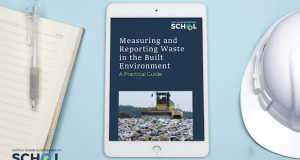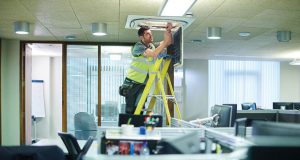 By Siobhan Riordan, Head of Sustainability – ISS UK & Ireland
By Siobhan Riordan, Head of Sustainability – ISS UK & Ireland
The world is at a critical moment, facing unprecedented global environmental challenges and societal change. We’ve just seen the hottest-ever recorded temperature on earth, while this summer and 2020 matched 2016 as the hottest year on record.
We’ve also emerged from a period of ecological instability, accompanied by some forceful warnings from the world’s leading climate scientists, into a more climate-conscious era. We are determined to take those warnings of irreversible planetary damage seriously.
To address these pressing issues, it’s important that we understand the link between changing our behaviours and changing the world. It’s our responsibility, both as individuals and as organisations, to adopt sustainable behaviours and lead the required transformational change.
It’s no surprise that this growing ethical standpoint would extend to the working world. The worldwide return to the workplace brought with it a renewed perspective, favouring social responsibility and employee wellbeing. Committing to a sustainable rhetoric gave businesses a double-barrelled approach to these evolving expectations.
As Head of Sustainability, I’ve seen these growing demands, delivering on them for clients and demonstrating those same high standards within our own workplaces. We are, after all, a business built for people, and championing sustainable workplaces is as crucial to their success as it is to ours.
As such, ISS’s net zero aspirations are clear; the company has committed to net zero carbon emissions across scopes 1 and 2 by 2030, and scope 3 by 2040. Much of the preliminary work has been technological, providing data-driven insights and efficiencies and sourcing lower CO2 products; simple to implement and equally as effective as prior solutions.
But products alone aren’t the answer. People are the bringers and benefactors of this push for sustainable solutions and as such, we trust in them to shape and convey our ambitions.
Earlier this year, we introduced our new signature ‘ROC’ principles — a three-step approach of reducing waste, optimising usage and changing behaviours. It’s this last one, changing behaviours, that is crucial; whilst making material improvements to the built environment, those working in it also need to establish the right behaviours to deliver.
Changing behaviours means encouraging and advocating for sustainable solutions. And with 360,000 placemakers on customer sites worldwide every day, ISS is perhaps uniquely positioned to drive behavioural change. The aim is to make sustainable thinking a natural part of working practice — so ingrained into our everyday working lives that it becomes a standard, not an afterthought. This approach, however, requires businesses, their suppliers and their customers to be aligned, and that can’t begin without societal change.
Having returned to the office after a tumultuous start to the 2020s, the social and collaborative possibilities of the workplace have a renewed importance. The FM industry has the most to gain from this redirection, not least when tailoring its premises for sweeping workplace initiatives.
For us, prominent additions such as resource hubs and establishing a circular economy mindset within customer estates have provided a social springboard, providing natural nudges towards better eco-consciousness. More overt changes, like Winnow’s food waste monitoring technology, give those of us responsible for food and catering the real-time and predictive statistics we need to reduce waste and costs. Spending and savings are now quantifiable, driving performance.
But engagement and behaviour change must go beyond training — it’s more than that. It’s how you recruit, communicate, deliver services, engage with customers, develop your people and connect with local communities.
And while these touchpoints are crucial, commitments need to be made loud and clear to help bring attention and set an example for others. Already, ISS has committed to partnering with suppliers and organisations that share our sustainability outlook and meet our rigorous criteria, from food and cleaning to hard FM and beyond. In remaining steadfast to our values and our vision when it comes to our own suppliers and partners, we set a positive example of what truly sustainable action looks like, both for our clients, our colleagues, our industry and even our society. That, one hopes, is the spark to ignite significant change that will help deliver much needed action to decarbonise our world and deliver a sustainable future.




